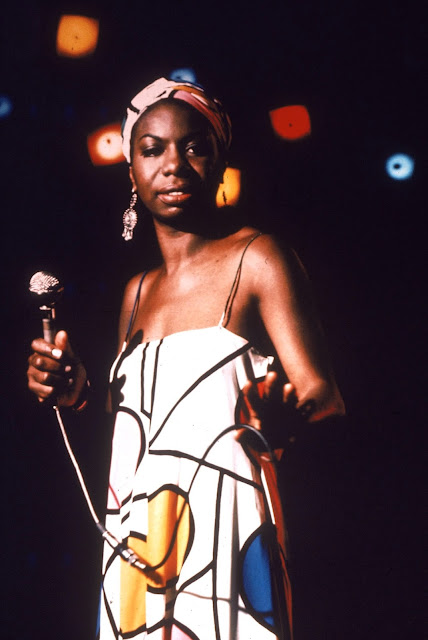What Happened, Miss Simone? (2015) Directed by Liz Garbus
As a singing and piano-playing woman artist who is always thinking about positions, gender, privilege and power relationships, the brand new documentary on Nina Simone was necessary viewing. (And because she is so amazing as a musician.) Even the title What Happened, Miss Simone? touched me (even though it may be a rather patronising question in the end). Lets face it, documentaries on women artists are still rather rare, even on this level of fame and genius. Nina Simone is one of those artists whose voice used to trouble me as a child and then later I understood the emotion and felt less crushed by it. Some years ago I read a Simone biography by David Brun-Lambert. Against the backdrop of my memory of the book, the new documentary did not add anything factually. Seeing Nina Simone was unsettling and inspiring nevertheless.

I guess the facts about Simone's life are not that known even to this day. Stories – especially stories about dead female artists have a funny way of getting lost or becoming over-simplified (see Siri Hustvedt's The Blazing World for more on this subject). Simone's path from classical concert piano training to playing and singing in clubs and becoming famous, rich and unhappy is not a straight line. It is important to keep talking about her continuous experience of racism, sexism and violence. It is a miracle to me that she stayed as prolific and functioning as she was. Her traumatic life experiences could have easily lead to complete inability to perform, play, create or live. It is also shocking to see that even when she was on top of her career, it seemed she had very little say in what she did and when she did it. Often it seemed artistic freedom was killed by duty or a tireless show business way of thinking. Even when the artist told everyone she was too tired to do anything.
 |
| Nina Simone |
Nick:
I was reading an article on a webpage recently (can't remember which one) and through a recognized successful writer, the feature was giving advice and points to aspiring songwriters as to what was needed to write 'hit' songs. The do's and don'ts if you like. One big no no was: don't ever write any political songs. As I read this it dawned on me why popular music has lost so much of its connectivity, its relevance, its cultural standing and meaning for many people (and if you don't think it has, you've missed something). I'm not talking about a golden era, but there was a time when through popular song the most powerful and far reaching impact on mass popular culture was afforded through a three minute pop song. 45 revolutions a minute if you like. It's whilst watching this sometimes very good documentary on Nina Simone that I realized I really long for the day where someone brings back this form of communication, this dialogue. Bringing something back to the mainstream that is sorely missing in these troubled times. A voice.
 |
| Nina Simone by Jack Robinson 1969 |
But what keeps us enthralled is Simone herself. Not only as a narrator but through some inspiring live performances. What Happened, Miss Simone? doesn't give us anything in the way of context to Simone's amazing music through her peers, musically or critically. It's one of the drawbacks of the documentary. Garbus could argue that Simone's music stands on its own without such counter -reference, and she may have a point. But here's the rub: Simone was and is one of the greats. On the same level (or better) than many revered musician rock stars or creative beings of the last 60 years or so. The fact that she isn't regularly sighted or the acknowledgement not recognized is our own shame. You could put it down to an oversight, or you could put it down to Simone being a WOMAN and BLACK. Still, What Happened, Miss Simone? is a timely reminder and reaffirmation of Simone's original genius and it is welcome. It also works as a testament to how we need that potent voice of Nina's now more than ever.












Comments
Post a Comment